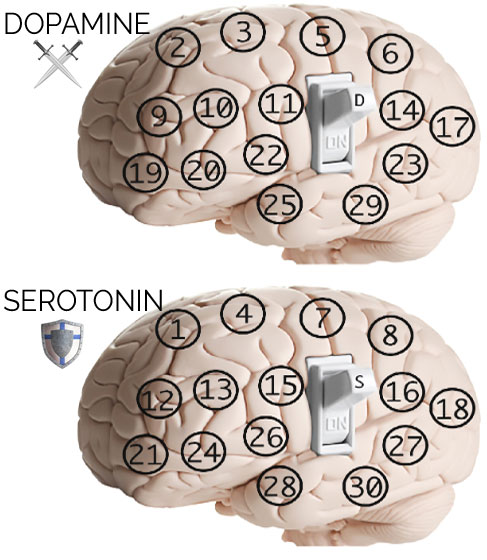| 1. I worry more than other people I know. | T | F |
| 2. I sometimes act before taking the time to consider all the issues. | T | F |
| 3. I enjoy a good adrenalin rush. | T | F |
| 4. I look at all the angles before taking action. | T | F |
| 5. By nature, I think of myself as being outwardly expressive. | T | F |
| 6. If I want something, I want it right now. | T | F |
| 7. I seem to worry a lot about my health. | T | F |
| 8. I’m not known for being aggressive. | T | F |
| 9. I’m pretty easily distracted. | T | F |
| 10. I prefer to lead rather than follow. | T | F |
| 11. I often begin new projects before I finish the ones I’ve started. | T | F |
| 12. Social situations can make me nervous. | T | F |
| 13. I’m willing to wait, sacrifice, and plan for things I want. | T | F |
| 14. I’m always on the hunt for something new. | T | F |
| 15. Fairly often, I find myself worrying to excess. | T | F |
| 16. It’s hard for me to express my anger and I often hold it in. | T | F |
| 17. I hate having to do the same old things over and over. | T | F |
| 18. When things go wrong, I tend to blame myself. | T | F |
| 19. I’m pretty assertive most of the time. | T | F |
| 20. People know when I’m mad. | T | F |
| 21. I find myself saying yes when I really mean no. | T | F |
| 22. I look at the big picture instead of paying attention to the small details. | T | F |
| 23. I’m not easily thrown by uncertainty. | T | F |
| 24. Being flexible is one of my strong suits. | T | F |
| 25. It’s often difficult for me to focus. | T | F |
| 26. When it comes to risk, I’m very cautious. | T | F |
| 27. I’m good at paying attention to detail. | T | F |
| 28. I tend to keep some of my feelings hidden. | T | F |
| 29. I’m at my best early in the morning. | T | F |
| 30. I think slowly, but I’m pretty accurate. | T | F |
Scoring
For every answer marked as true, fill in the circle corresponding to the question number on the graphics of the brain below. Whichever brain has more circles filled represents your neurotype—Shield or Sword. You will likely have circles filled on both images. That’s because there are no pure brain types. However, your “predominate” brain type will predict both how you are likely to respond to stress and the ways in which you will manage discomfort.
Congratulations. You have now identified yourself as a Sword or Shield in terms of how you’re likely to react and cope with stress. If you have more ‘trues’ marked in the Shield brain, you are likely to be less aggressive and carry a shield into your battle with stress, but if you scored more trues in the Sword brain, then pick up your blade and understand how you wield it!
As you may now surmise, one of humanity’s tribes, the Swords, is coded to be particularly sensitive to stimulation, novelty, and reward while the Shields of the world are coded to be more sensitive to avoiding harm and danger. Each coping style possesses strengths as well as an array of behavioral shortcomings.
The understanding of these two distinctive patterns that humans deploy to manage stress provides an explanation for a variety of behaviors whose origins have remained poorly understood. More importantly, it points the way to type-specific interventions that have proven effective when stress-coping styles go awry in the lives of our patients.
See how your Sword or Shield behaviors line up with the lists below. And as we’ve indicated, you may recognize some of your behaviors on both sides of this chart and this is consistent with our knowledge that we all share some behaviors on our non-dominate brain type side of the equation.
BRAIN TYPE BEHAVIORS

SWORDS
Extrovert
Sympathetic reactivity
Seeks out stimulation
Difficult to arouse
Motivated by anticipating reward
Likely to imprint memories of positive
Tends to act before thinking
Difficult to delay gratification
Poorly controlled impulses
Seeks out novelty, risk tolerant/seeking
Let’s anger out
Tends towards optimism
Coping style is fast but often inaccurate
Low attention to detail
Depends on routines
Rigid, doesn’t do well with change
Tendency toward symptom denial
Sexual addictions
Addictions to cocaine and stimulants
Low pain tolerance

SHIELDS
Introvert
Parasympathetic reactivity
Seeks to avoid stimulation
Easily aroused
Motivated by avoiding punishment
Likely to imprint memories of negative outcomes
Tends to pause and think before acting
Able to delay gratification
Controls impulses easily
Low need for novelty/risk averse
Holds anger in
Tends toward pessimism
Coping style is slow but accurate
High attention to detail
Avoids routines
Flexible and adaptive to change
Tendency toward hypochondriasis
Sexual problems
Addictions likely to alcohol and sedatives
High pain tolerance

